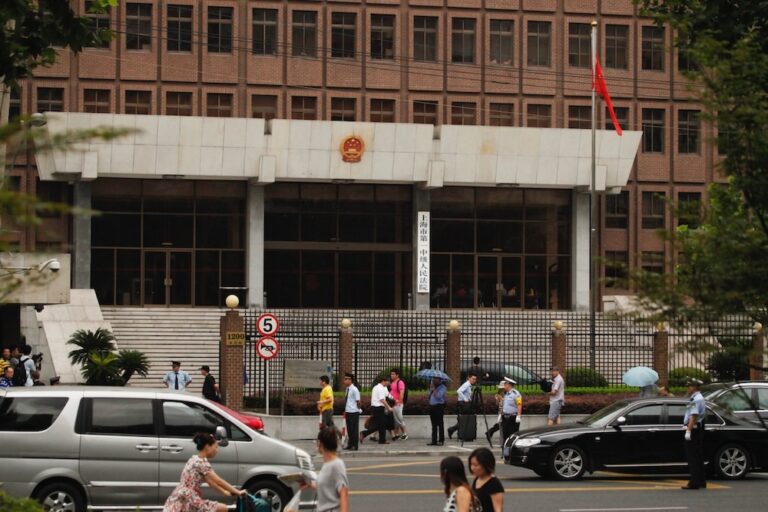The public's enthusiasm for the Internet and the government's fear of online protests has resulted in constant advancements in online censorship, reports RSF.
(RSF/IFEX) – 31 August 2011 – The authorities continue to reinforce their control over the Internet in China, which held its 10th annual China Internet Conference on 23 August in Beijing.
Use of the Internet has grown enormously in recent years. China now has half a billion Internet users. Facebook and Twitter are censored but Sina Weibo, the Chinese microblogging website, has more than 200 million users. The public’s enthusiasm for the Internet and the government’s fear of online protests has resulted in constant advancements in online censorship. Weibo, for example, now employs 100 people around the clock just to monitor the content being posted online, according to the magazine Forbes.
Below is an overview of the latest Chinese “innovations” in Internet censorship and control.
Cyber-attacks
In a report published earlier this month, McAfee’s Internet security experts said they believed a major state-sponsored hacking campaign had been under way since 2006. China was suspected as the author of the campaign. “Everything points to China,” security expert Jim Lewis said. There was evidence in support of the claim in a 17 July report, aired on China’s state-owned TV station CCTV-7, showing someone carrying out a DDoS-type attack on a site operated by the Falun Gong movement, which is banned in China. The report was subsequently removed from the station’s website.
The Chinese authorities also reportedly orchestrated a wave of cyber-attacks on Tibetan websites in mid-August after a young Tibetan monk, Tsewang Norbu, set fire to himself. The authorities had already tightened censorship after another young monk, Phuntsog, set fire to himself in Kirti in March. According to Free Tibet, the phone lines in the region were temporarily cut and Internet cafés were closed.
Economic censorship of Internet cafés
The authorities have also forced public WiFi access providers to install extremely expensive user tracking software. As a result, they are both reinforcing their control of Internet traffic and imposing a form of economic censorship, as small businesses have to stop offering WiFi if they cannot afford the software.
Healthy Internet
The official news agency Xinhua reported on 8 August that the government wanted to tighten Internet access rules in order to guarantee “a healthy Internet” for future generations. In its Plan for the Development of Chinese Children covering the period until 2020, the government talks of an additional software programme for children that will “filter dangerous content.” The plan also envisages banning minors from Internet cafés.
During a visit to the headquarters of Sina Corp on 22 August, Beijing party secretary Liu Qi called on Internet entrepreneurs to reinforce control of content circulating online. In a clearly-worded directive the same week, the Beijing Internet Media Association said: “Online news should be trustworthy and should not spread rumours or vulgar content.” The microblogging website Weibo was quick to comply, closing the accounts of some users for a month for allegedly spreading “false rumours.”
Censorship circumvention
Chinese Internet users are familiarizing themselves with the use of censorship circumvention resources, a development that both the authorities and some private-sector companies intend to check. The business site Taobao.com decided on 23 August to stop selling Virtual Private Networks and proxies without being told to do so by the authorities. Reporters Without Borders is disturbed to see the private sector anticipating government orders on Internet user control.
Arrests and repression
Arrests and convictions of netizens are meanwhile continuing. Wang Lihong appeared in court on 12 August for trying to organize a demonstration. The verdict will be announced in September. She is facing a possible five-year sentence.
It turns out that Hu Di, a netizen who went missing in March, was in fact put in a psychiatric hospital although he has no mental illness. He is now in poor physical health but his morale is high, according to another cyber-dissident, Zheng Tao, who was able to visit him. Zheng has himself been detained since 21 August as a result of the visit.
Ding Mao and Chen Wei, two netizens who were arrested on 19 and 20 February, are still detained. They were taken before a prosecutor for the second time in mid-August. The authorities must now decide whether to try or release them.
The cyber-dissident Liu Gengsong was meanwhile released on 23 August upon completing a four-year jail sentence.
Reporters Without Borders calls on the authorities to release all imprisoned netizens without delay and to drop all the charges against them. China is on the Reporters Without Borders list of Enemies of the Internet and is ranked 171st out of 178 countries in its press freedom index.


